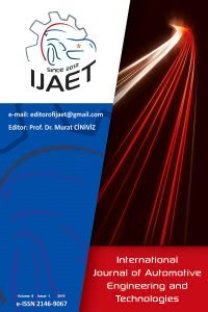Impacts of biodiesel blends with organic-based manganese additive on performance and emission characteristics of a single cylinder diesel engine
Impacts of biodiesel blends with organic-based manganese additive on performance and emission characteristics of a single cylinder diesel engine
Biodiesel production from waste frying oil as a fuel can help the recycling and contributing tothe economy. Transesterification reaction is preferred, it is not because the most commontechnique, it is one of the most efficient ways for the biodiesel production. Thetransesterification parameters of waste frying oil were applied as 6:1 Methanol to oil molar ratiowith NaOH catalyst 0.4 g (w/w), 57°C reaction temperature, and 60 minutes reaction time andtransesterification yield 88.5%. In this study, the effect of biodiesel blends with the organic-based manganese additive on performance and exhaust emissions of a single-cylinder, four-stroke, direct injected diesel engine with air cooling system at 2200 1/min fixed engine speedand with four different engine loads was experimentally investigated. The engine loads are(BMEP, 0.12 MPa, 0.24 MPa, 0.36 MPa and 0.48 MPa), and at the beginning of the tests, theengine was warmed with No. 2 diesel fuel. The oil and inlet air temperatures were kept at 85±2 °C and 25 ±1 °C, respectively. The testing fuels used in the experiments were composed ofwaste frying oil biodiesel blended with the No. 2 diesel fuel volumetrically with the ratio of 20,40 and 60, respectively. The results obtained from the experimental study were compared withNo. 2 diesel fuel. The effects of blends on CO, THC, NOx and smoke were investigated byemission tests. Additionally, brake specific fuel consumption of test fuels was examined. Byvirtue of the environmental effects, biodiesel production from waste frying oil has been becomesignificant.
___
- H.K. Rashedul, H.H. Masjuki, M.A. Kalam, A.M. Ashraful, S.M. Ashrafur Rahman, S.A. Shahir. The effect of additives on properties, performance and emission of biodiesel fuelled compression ignition engine. Energy Conversion and Management. 88 (2014) 348–364.
- K. Naima, A. Liazid. Waste oils as alternative fuel for diesel engine: A review. Journal of Petroleum Technology and Alternative. Fuels. 4(3) (2013) 30-43.
- M. Gürü, A. Koca, Ö. Can, C. Çınar, F. Şahin. Biodiesel production from waste chicken fat based sources and evaluation with Mg based additive in a diesel engine. Renewable Energy. 35 (2010) 637–643.
- X.J. Man, C.S. Cheung, Z. Ning, L. Wei, Z.H. Huang. Influence of engine load and speed on regulated and unregulated emissions of a diesel engine fueled with diesel fuel blended with waste cooking oil biodiesel. Fuel. 180 (2016) 41–49.
- M. Gürü, B.D. Artukoğlu, A. Keskin, A. Koca. Biodiesel production from waste animal fat and improvement of its characteristics by synthesized nickel and magnesium additive. Energy Conversion and Management. 50 (2009) 498–502.
- A. Keskin, M. Gürü, D. Altıparmak. Biodiesel production from tall oil with synthesized Mn and Ni based additives: Effects of the additives on fuel consumption and emissions. Fuel. 86 (2007) 1139–1143.
- A. Keskin, M. Gürü, D. Altıparmak. Influence of metallic based fuel additives on performance and exhaust emissions of diesel engine. Energy Conversion and Management. 52 (2011) 60–65.
- A.N. Phan, T.M. Phan. Biodiesel production from waste cooking oils. Fuel. 87 (2008) 3490–3496.
- J.M. Encinar, J.F. Gonzalez, A.R. Reinares. Biodiesel from Used Frying Oil. Variables Affecting the Yields and Characteristics of the Biodiesel. Ind. Eng. Chem. Res. 44 (2005) 5491-5499.
- Z. Utlu, M.S. Koçak. The effect of biodiesel fuel obtained from waste frying oil on direct injection diesel engine performance and exhaust emissions. Renewable Energy. 33 (2008) 1936–1941.
- P. Tamilselvan, N. Nallusamy, S. Rajkumar. A comprehensive review on performance, combustion and emission characteristics of biodiesel fuelled diesel engines. Renewable and Sustainable Energy Reviews. 79 (2017) 1134–1159.
- Başlangıç: 2012
- Yayıncı: Murat CİNİVİZ
Sayıdaki Diğer Makaleler
Ayhan UYAROĞLU, İsmet ÇELİKTEN
Murat CİNİVİZ, İlker ÖRS, Ali KAHRAMAN
